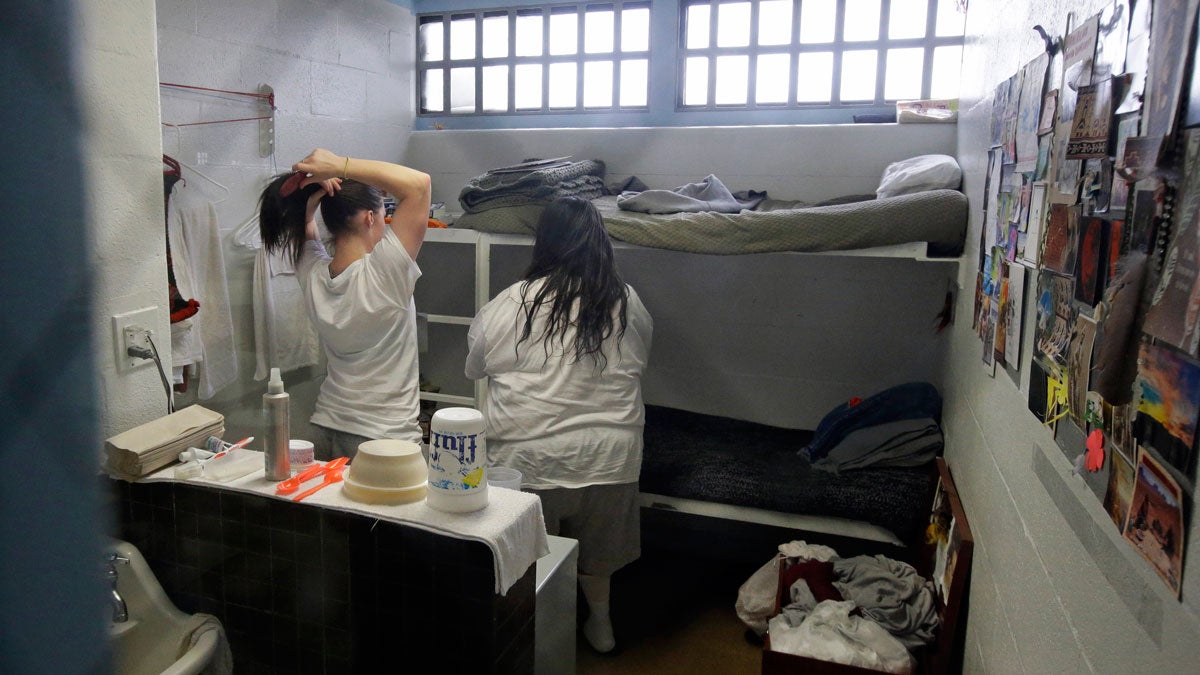Female Pa. lawmakers hope to help incarcerated women with series of bills
When moms are imprisoned, it hurts families, neighborhoods and communities, legislator says.

Female inmates interact in their cell in this file photo. (Rick Bowmer/AP Photo, Pool)
Women and girls make up the fastest-growing population in U.S. prisons — and African-American and Hispanic women represent a disproportionate number of those behind bars.
The number of imprisoned women and girls in the U.S. has increased 700 percent since 1980 — nearly twice the rate of men.
Women of the Pennsylvania Legislative Black Caucus are proposing bills to specifically meet the needs of the female inmates.
In Pennsylvania, the incarcerated male population has dropped 4 percent since 2011, while the number of female inmates has grown 5 percent.
Women make up just 6 percent of the state’s prison population. While they’re nowhere near the majority, the increasing number of female inmates is making family-centered issues more of a priority.
The proposals include requiring state prisons to provide free feminine hygiene products, sponsored by state Rep. Isabella Fitzgerald of Philadelphia, and creating a system to help women register for social service benefits before their release, backed by state Rep. Joanna McClinton of Philadelphia and Delaware County.
State Rep. Morgan Cephas, D-Philadelphia, has proposed the Pennsylvania Commission on Crime and Delinquency add a Committee on Women and Girls.
“When you have a high percentage of single mothers in the Commonwealth of Pennsylvania, especially among minority groups, and you put them in our prison systems, just think of how many families that’s impacting,” she said.
Eighty percent of female inmates are mothers — usually the primary caregiver and breadwinner of their family, Cephas said.
“These women just come into the prison system with serious differences than their male prisoners,” she said. “When you have women that are mothers when they come in, it’s almost, ‘What happens to the children as they’re on the outside? How do we protect them from going into that [school-to-prison] pipeline? How do we make sure that they maintain a connection to the parent?’”
Entire communities, families and neighborhoods are impacted when mothers are incarcerated, Cephas noted.
She said 82 percent of those female inmates are nonviolent offenders, while many are drug and alcohol dependent.
Modeled on federal proposal
The legislative package was modeled after a U.S. Senate bill, Dignity for Incarcerated Women Act, sponsored by U.S. Sen. Cory Booker, D-New Jersey, but it is tailored for Pennsylvania’s needs, Cephas said.
Cephas, chair of the women and girls subcommittee for the Legislative Black Caucus, says the subcommittee spent six months talking to Department of Corrections representatives, policymakers and other stakeholders. They also toured the Muncy Correctional Facility, one of two correctional facilities in the state specifically for women, several times and spoke with inmates.
“It was a real opportunity to just come together to raise our voices and make sure this criminal justice reform conversation doesn’t leave behind — but specifically recognizes — the uniqueness of when women are in our prison system,” she said.
Another bill offers a free monthly phone call to incarcerated parents.
“They can be quite exorbitant fees that can be detrimental for a family or even just prohibitive to a family that’s trying to maintain contact with a loved one,” said state Rep. Donna Bullock, D-Philadelphia, who is sponsoring the bill.
In other states, she said, these phone calls can cost $1 a minute.
The costs would not be passed on to taxpayers. Instead, savings would come from the state renegotiating its telecommunications contract.
“We will see these kinds of issues also shining a light on — not just the issues that impact women in prison — but on anyone who’s in prison and hopefully can be a part of the fabric of that criminal justice reform,” Bullock said.
Bullock has been working with a library in the Strawberry Mansion neighborhood of Philadelphia on its Stories Alive program. It allows children to video-conference a reading session with their parent in the county prisons.
“It helps cultivate that relationship while also building literacy skills and strengthening a child’s confidence knowing that they are able to improve their skills along with their parents,” she said.
Striving for a better start
State Rep. Patty Kim, D-Dauphin, is sponsoring a bill that would provide postpartum housing for inmates and their newborns.
The proposal would allow a woman who gives birth in prison to have special accommodation that would allow her to be with her child for up to 18 months in a different, baby-friendly part of the prison.
“We have seen the negative impact of a lot of fathers going away to prison, breaking up families. It has really hurt our societies, with kids growing up without their fathers,” Kim said. “Now, we have the unfortunate trend where more women are going to prison. I wanted to try to do two things: To stop that trend of families separating and … maintain some kind of dignity for inmates in prison.”
It will lead to a healthier family and ultimately a healthier society — and a potential cost-saving measure, she said.
“If the child has no immediate family to go to, the baby goes into foster care, which costs state and county money,” Kim said.
The state lawmakers hope to raise awareness and broader conversation around criminal justice and prison reform.
“When we think about criminal justice reform in the city of Philadelphia, we’re thinking about Meek Mill and the other African-American males or minority males that are behind bars and that haven’t gotten a fair shake,” Cephas said. “But we also have to think about the women that are behind bars that are being impacted as well.”
Next steps include reaching across the aisle this summer to get Republicans to co-sponsor the bills.
The Pennsylvania House of Representatives returns to session in September.
WHYY is your source for fact-based, in-depth journalism and information. As a nonprofit organization, we rely on financial support from readers like you. Please give today.





